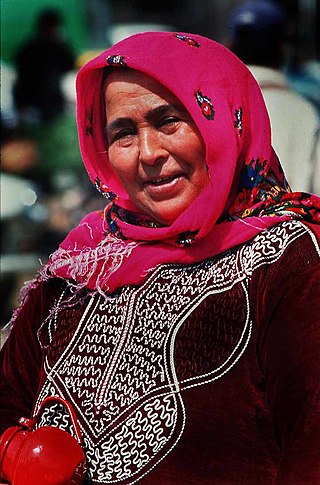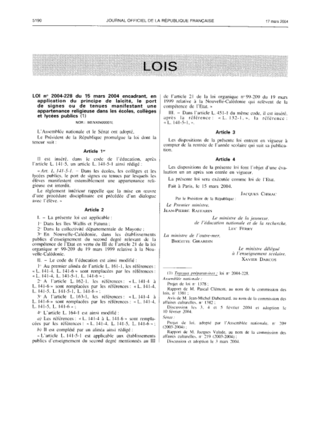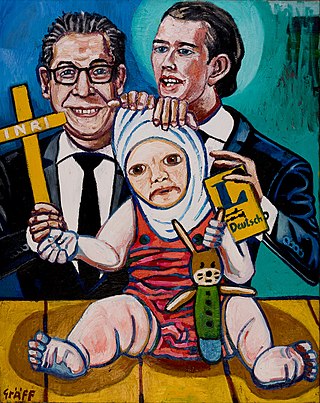Related Research Articles

In modern usage, hijab generally refers to various head coverings conventionally worn by many Muslim women. It is similar to the tichel or snood worn by Orthodox Jewish women, certain headcoverings worn by some Christian women, such as the mantilla, apostolnik and wimple, and the dupatta worn by many Hindu and Sikh women. Whilst a hijab can come in many forms, it often specifically refers to a scarf wrapped around the head, covering the hair, neck and ears but leaving the face visible. The use of the hijab has been on the rise worldwide since the 1970s and is viewed by many Muslims as expressing modesty and faith; it has also been worn for purposes of adornment. There is a consensus among Islamic religious scholars that covering the head is either required or preferred, though some Muslim scholars and activists point out that it is not mandated.

A kippah, yarmulke, yamaka, bullcap, or koppel is a brimless cap, usually made of cloth, traditionally worn by Jewish males to fulfill the customary requirement that the head be covered. It is worn by all men in Orthodox Jewish communities during prayers and by most Orthodox Jewish men at all other times. Among non-Orthodox Jewish communities, some who wear them do so at all times, while others wear them only during prayer, while attending a synagogue, or in other ceremonies.

The French law on secularity and conspicuous religious symbols in schools bans wearing conspicuous religious symbols in French public primary and secondary schools. The law is an amendment to the French Code of Education that expands principles founded in existing French law, especially the constitutional requirement of laïcité: the separation of state and religious activities.

Bella Savitzky Abzug, nicknamed "Battling Bella", was an American lawyer, politician, social activist, and a leader in the women's movement. In 1971, Abzug joined other leading feminists such as Gloria Steinem, Shirley Chisholm, and Betty Friedan to found the National Women's Political Caucus. She was a leading figure in what came to be known as eco-feminism.

Islamic clothing is clothing that is interpreted as being in accordance with the teachings of Islam. Muslims wear a wide variety of clothing, which is influenced not only by religious considerations, but also by practical, cultural, social, and political factors. In modern times, some Muslims have adopted clothing based on Western traditions, while others wear modern forms of traditional Muslim dress, which over the centuries has typically included long, flowing garments. Besides its practical advantages in the climate of the Middle East, loose-fitting clothing is also generally regarded as conforming to Islamic teachings, which stipulate that body areas which are sexual in nature must be hidden from public view. Traditional dress for Muslim men has typically covered at least the head and the area between the waist and the knees, while women's islamic dress is to conceal the hair and the body from the ankles to the neck. Some Muslim women also cover their face. However, other Muslims believe that the Quran does not mandate that women need to wear a hijab or a burqa.

Phyllis Lorberblatt Kahn is an American politician and former member of the Minnesota House of Representatives. A member of the Minnesota Democratic–Farmer–Labor Party (DFL), she represented portions of the city of Minneapolis for 44 years. On August 9, 2016, Ilhan Omar defeated Kahn in the DFL primary for District 60B.

In France, there is an ongoing social, political, and legal debate concerning the wearing of the hijab and other forms of Islamic coverings in public. The cultural framework of the controversy can be traced to France's history of colonization in North Africa, but escalated into a significant public debate in 1989 when three girls were suspended from school for refusing to remove their headscarves. That incident, referred to in France as l'affaire du foulard or l'affaire du voile, initially focused the controversy on the wearing of the hijab in French public schools. Because of the wide-ranging social debates caused by the controversy, l'affaire du foulard has been compared to the Dreyfus affair in its impact on French culture.
Hijab and burka controversies in Europe revolve around the variety of headdresses worn by Muslim women, which have become prominent symbols of the presence of Islam in especially Western Europe. In several countries, the adherence to hijab has led to political controversies and proposals for a legal partial or full ban in some or all circumstances. Some countries already have laws banning the wearing of masks in public, which can be applied to veils that conceal the face. Other countries are debating similar legislation, or have more limited prohibitions. Some of them apply only to face-covering clothing such as the burqa, boushiya, or niqab; some apply to any clothing with an Islamic religious symbolism such as the khimar, a type of headscarf. The issue has different names in different countries, and "the veil" or hijab may be used as general terms for the debate, representing more than just the veil itself, or the concept of modesty embodied in Hijab.

Frederica Smith Wilson is an American politician who has been a member of the United States House of Representatives since 2011, representing Florida's 24th congressional district. Located in South Florida, Wilson's congressional district, numbered 17th during her first term, covers a large swath of eastern Miami-Dade County and a sliver of southern Broward County. The district contains most of Miami's majority-black precincts, as well as parts of Opa-locka, North Miami, Hollywood, and Miramar. Wilson gained national attention in 2012 for her comments on the death of Trayvon Martin.
Religious clothing is clothing which is worn in accordance with religious practice, tradition or significance to a faith group. It includes clerical clothing such as cassocks, and religious habit, robes, and other vestments. Accessories include hats, wedding rings, crucifixes, etc.
The Bouchard-Taylor commission, officially the Quebec Consultation Commission on Accommodation Practices Related to Cultural Differences, was created on 8 February 2007 by Quebec premier Jean Charest. Its mandate was to examine questions related to reasonable accommodation allowed because of cultural or religious differences in Quebec.

Various styles of head coverings, most notably the khimar, hijab, chador, niqab, paranja, yashmak, tudong, shayla, safseri, carşaf, haik, dupatta, boshiya and burqa, are worn by Muslim women around the world, where the practice varies from mandatory to optional or restricted in different majority Muslim and non-Muslim countries.

Headgear, headwear, or headdress is any element of clothing which is worn on one's head, including hats, helmets, turbans and many other types. Headgear is worn for many purposes, including protection against the elements, decoration, or for religious or cultural reasons, including social conventions.

Ilhan Abdullahi Omar is an American politician serving as the U.S. representative for Minnesota's 5th congressional district since 2019. She is a member of the Democratic Party. Before her election to Congress, Omar served in the Minnesota House of Representatives from 2017 to 2019, representing part of Minneapolis. Her congressional district includes all of Minneapolis and some of its first-ring suburbs.

María Elvira Salazar is an American journalist, author, and politician serving as the U.S. representative for Florida's 27th congressional district. She is a Republican assistant whip. Before entering politics, Salazar worked for the Spanish-language network Telemundo for three decades after serving as a news anchor for Miami-based WSBS TV. She has also worked for CNN Español and Univision.

Summer Lynn Lee is an American politician who is the U.S. representative for Pennsylvania's 12th congressional district since 2023. A member of the Democratic Party, Lee was a member of the Pennsylvania House of Representatives for the 34th district from 2019 to 2022. With the support of the local chapter of the Democratic Socialists of America (DSA), Lee was the first black woman to represent Southwestern Pennsylvania in the state legislature.

Hijabophobia is a type of religious and cultural discrimination against Muslim women who wear the hijab. The discrimination has had manifestations in public, working and educational places.

The 2020 United States House of Representatives elections in Minnesota was held on November 3, 2020, to elect the eight U.S. representatives from the state of Minnesota, one from each of its congressional districts. Primary elections were held in six districts on August 11. The elections coincided with the 2020 United States presidential election as well as other elections to the House of Representatives, elections to the United States Senate and other state and local elections.
This article covers the religious affiliation in the United States House of Representatives.

The 2022 United States House of Representatives elections in Minnesota were held on November 8, 2022, to elect the eight U.S. representatives from the state of Minnesota, one from each of the state's eight congressional districts. The elections coincided with other elections to the House of Representatives, elections to the United States Senate and various state and local elections.
References
- ↑ "The Ban on Hats on the House Floor". United States House of Representatives: History, Art & Archives. Retrieved November 19, 2018.
- ↑ "(Congress)Men without Hats". United States House of Representatives: History, Art & Archives. Retrieved November 20, 2018.
- ↑ Lila Thulin (April 20, 2018). "What You Can and Can't Bring onto the Floor in Congress". Washingtonian.
- 1 2 "Muslim lawmaker wants to overturn ban on kippahs, hijabs and hats in Congress". Jewish Telegraphic Agency. November 19, 2018.
- ↑ Kellman, Steven G. (December 5, 2007). "Remembering Bella Abzug". San Antonio Current.
- ↑ Debbie Siegelbaum (April 19, 2011). "Dressed to legislate". The Hill.
- ↑ Amy Sherman (November 19, 2010). "Congresswoman-elect Frederica Wilson says hat ban started in 1800s but can be waived". PolitiFact.
- ↑ Zamira Rahim. "Democrats plan to lift ban on religious headwear in House of Representatives". The Independent.
- ↑ AJ Willingham (November 19, 2018). "New Muslim congresswoman will seek to allow religious headwear in the House". CNN.
- ↑ Lejandro de la Garza (November 18, 2018). "Democrats Want to Change a 181-Year-Old Rule to Allow Religious Headwear in the House". Time.
- ↑ "House finally lifting hat ban after 181 years". New York Post. November 15, 2018.
- ↑ H.Res. 6, §102(x)